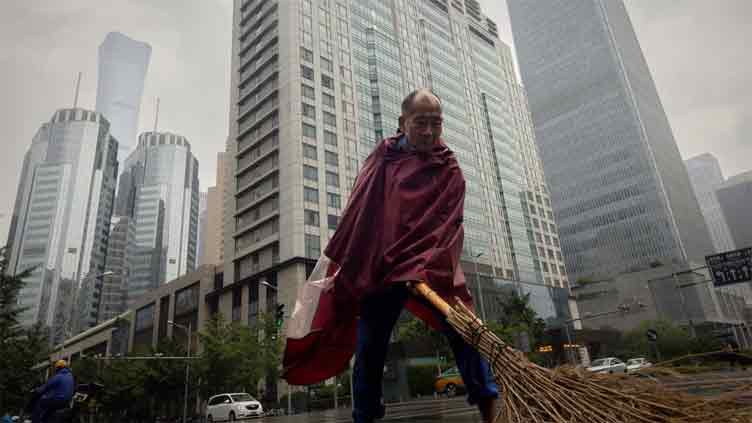The steps taken by China to shore up a shaky economic recovery

Business
Issuance of $137bn sovereign bonds is the latest decision
BEIJING (Reuters) – China has rolled out a slew of policy measures in recent months to revive a stumbling economy after its post-pandemic recovery fell away quickly.
Thanks to the government support, the world's second-largest economy staged a faster than expected growth in the third quarter, improving the chances Beijing can meet its growth target of around 5% for 2023.
But economists say a property crisis, depressed private sector confidence, a slowdown in global growth and Sino-U.S. tensions over technology and geopolitics still pose challenges to policymakers in Beijing as they seek to sustain the growth momentum.
The following is a list of recent policy support measures:
Oct 24 - China's top parliament body approved a 1 trillion yuan ($137 billion) sovereign bond issue and passed a bill to allow local governments to frontload part of their 2024 bond quotas.
Oct 23 - China's state fund Central Huijin Investment said it had bought exchange-traded funds (ETFs) and would continue to do so, as Chinese stocks dropped to four-and-a-half-year lows.
Oct 11 - China's "Big Four" state banks said that their state parent, Central Huijin Investment, had bought the lenders' Shanghai-traded shares, and planned to further increase holdings within the next six months.
Sept 22 - The country's top market regulator issued 22 measures to promote the development of the private economy, including breaking down barriers to market access for private firms.
Sept 14 - China's central bank said it would cut the amount of cash that banks must hold as reserves for the second time this year to boost liquidity and support the country's economic recovery.
Sept 4 - China's central government approved setting up a special bureau within the National Development and Reform Commission (NDRC) to promote the development of the private economy.
Sept 1 - China's central bank said it would cut the amount of foreign exchange that financial institutions must hold as reserves for first time this year, a move seen aimed at slowing the pace of recent yuan depreciation.
Sept 1 - China is set to take further action including relaxing home-purchase restrictions to try and stabilise its debt-riddled property sector, four people familiar with the matter said.
Sept 1 - China stepped up measures to boost the country's faltering economy, with top banks paving the way for further cuts in lending rates.
Aug 31 - China's central bank and financial regulator issued notices to ease some borrowing rules to aid homebuyers, including lowering the existing mortgage rate for first-home buyers and the down payment ratio in some cities.
Aug 31 - Major Chinese cities said they will allow people to take preferential loans for first-home purchases regardless of their credit records.
Aug 25 - China's cabinet approved guidelines for planning and construction of affordable housing at a meeting chaired by Premier Li Qiang.
Aug 21 - China cut its one-year benchmark lending rate but surprised markets by keeping the five-year rate unchanged amid broader concerns about a rapidly weakening currency.
Aug 15 - China's central bank unexpectedly chopped one set of key interest rates, and followed it with cuts on other rates hours later.
Aug 2 - China's finance ministry unveiled a package of tax relief measures for small businesses and rural households.
July 31 - China's cabinet issued measures to boost consumption in the automobile, real estate and services sector, aiming to give full play to the "fundamental role" of consumption in economic development.
July 28 - State media quoted the housing minister as saying that China needs to effectively take steps to lower home mortgage rates and down payment ratios for first-time buyers to help spur home purchases. Borrowers in some cities are still waiting for that to happen.
July 24 - China's top leaders, at a Politburo meeting, pledged to step up support for the economy, signalling more stimulus steps. A rare omission of "housing for living, not for speculation" in the official readout fanned expectations of more measures to boost activity in the property market.
July 24 - China's state planner unveiled measures to support private investment in some infrastructure sectors and said it will strengthen financing support for private projects.
July 21 - The cabinet approved guidelines on transforming "urban villages", or underdeveloped areas, in megacities, which will help underpin property investment.
July 19 - The Communist Party and the cabinet issued guidelines to support the private economy, pledging to make the sector "bigger, better and stronger" with a total of 31 policy measures.
July 18 - China's commerce ministry announced a series of measures aimed at boosting household consumption of goods and services.
July 14 - China's cabinet approved guidelines for improving the building of public infrastructure in megacities, to help support the economy and cope with future public health crises.
June 30 - China's central bank increased its relending and rediscount quotas by 200 billion yuan to support the farm sector and small firms.
June 20 - China's central bank cut its key lending benchmarks, or loan prime rates (LPR), for the first time in 10 months.


